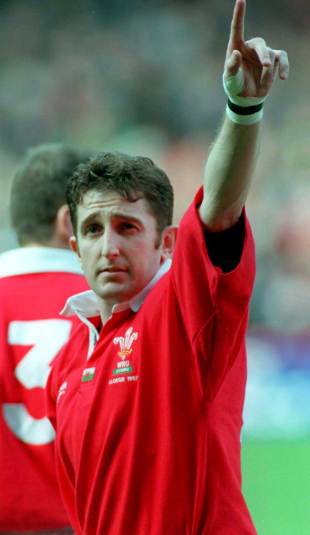|
Wales 13-34 England, Cardiff Arms Park, Five Nations
Arms Park bids farewell to Wales
Richard Seeckts
March 15, 1997

Jonathan Davies pays tribute to the Welsh crowd
© PA Photos Enlarge
The final international match at Cardiff Arms Park, before reconstruction as the Millennium Stadium, saw England trounce Wales with four second half tries to claim their fifth Triple Crown in seven years. The match also brought the curtain down on the careers of three great men of rugby; Rob Andrew, Will Carling and Jonathan Davies. Davies had made his international debut opposite Andrew in 1985 as a young amateur. In the interim, Davies had spent half of his career playing rugby league and Andrew had - he thought - wrapped up a stellar England career at the 1995 World Cup. Fate had it that injuries to Arwel Thomas and Paul Grayson brought the old men together for the closing minutes of 113 years rugby at the Arms Park. It was widely expected that this would be Carling's last England game, but he was by no means certain. "I'm a long way from retiring from international rugby. Don't rule me out of another trip to Cardiff Arms Park when it is rebuilt," he said afterwards. "I really have not made up my mind. Assuming the selectors still want me, then England may not have seen the last of me. In my mind, I will carry on next season only if I can make it to the World Cup in 1999." It was not to be, but the uncertainty of the situation prevented the fanfare that surrounds the retirements of modern sporting icons. Both teams came to Cardiff with significant injury absentees. Wales were without Ieuan Evans, Scott Gibbs, Thomas and Colin Charvis; England missed Grayson and Lawrence Dallaglio. Both teams had thrashed Scotland and lost narrowly to France, the eventual Grand Slam winners. Against Ireland, Wales had lost by a single point, while England buried them with six tries at Lansdowne Road. This was the mystifying spell in English rugby when the 'prince of centres', Jeremy Guscott, sat on the bench to make way for captain Phil de Glanville and former captain Will Carling. It makes no more sense now than it did at the time. The course of this match swung dramatically in England's favour in the second half, when right winger Jon Sleightholme, the Chris Ashton of his era, was replaced by Guscott. Ragged and uncertain before the break, England finished with a "glittering final quarter which is now England's trademark," according to Chris Rea in the Independent on Sunday. Wales' pack held up well in the first half, with Gareth Llewellyn getting the better of the lineout. They were disrupted by the loss of both prop Christian Loader and full-back Neil Jenkins in the first quarter, the latter with a broken arm. Wales' backs were too slow and committed basic errors; only Rob Howley rose above the mediocre but his reward, a try with the last play of the game, was too little, too late. England ruthlessly exploited the holes is Wales' defence. Tim Stimpson played his best game in an England shirt and, given the time and space to demonstrate his running strength, scored the first try. Minutes later Tony Underwood ripped through the shabby defence and charged 60 metres to touch down. From then it was just a question of how big the margin of victory would be and, with better finishing, England might have scored a bucketful of tries. As it was, they got two more, finished by Richard Hill and de Glanville, to lead 34-6 until Howley's consolation score.

England's Tim Stimpson looks for an offload © PA Photos
Enlarge
When England were 6-3 up after a tight first half, few would have expected the runaway final 40 minutes. Guscott's fleet-footedness reminded everyone what England had been keeping in reserve during a Five Nations Championship that had seen them score 141 points including 15 tries. England coach, Jack Rowell explained, "After the break we scored some cracking tries. We got early ball and developed the sort of interactive football we've been aspiring to." With the game won, Rowell gave way to sentiment and replaced Mike Catt with Andrew for the last few minutes, almost two years after his international 'retirement'. Rowell purred, "The welcome the crowd gave him at the end showed us what rugby is all about." The last word went to Jonathan Davies, who converted Howley's try. He knew, and everyone else knew, that he'd lost the pace and magic of old but injury to Arwel Thomas had allowed him, somewhat reluctantly, to bow out on Cardiff's stage. "We tried everything," admitted Welsh captain Jonathan Humphreys. "This England team is a much better side than last year's." 
© PA Photos
Enlarge
© ESPN Sports Media Ltd
| |||||||||||||||
Live Sports
Communication error please reload the page.
-
Football
-
Cricket
-
Rugby
-
- Days
- Hrs
- Mins
- Secs
F1 - Abu Dhabi GP
Abu Dhabi Grand Prix December 11-131. Max Verstappen ()
2. Valtteri Bottas (Mercedes)
3. Lewis Hamilton (Mercedes)
4. Alexander Albon ()
5. Lando Norris ()
6. Carlos Sainz Jr ()
-
ESPNOtherLive >>
Snooker - China Open
Tennis - Miami Open

